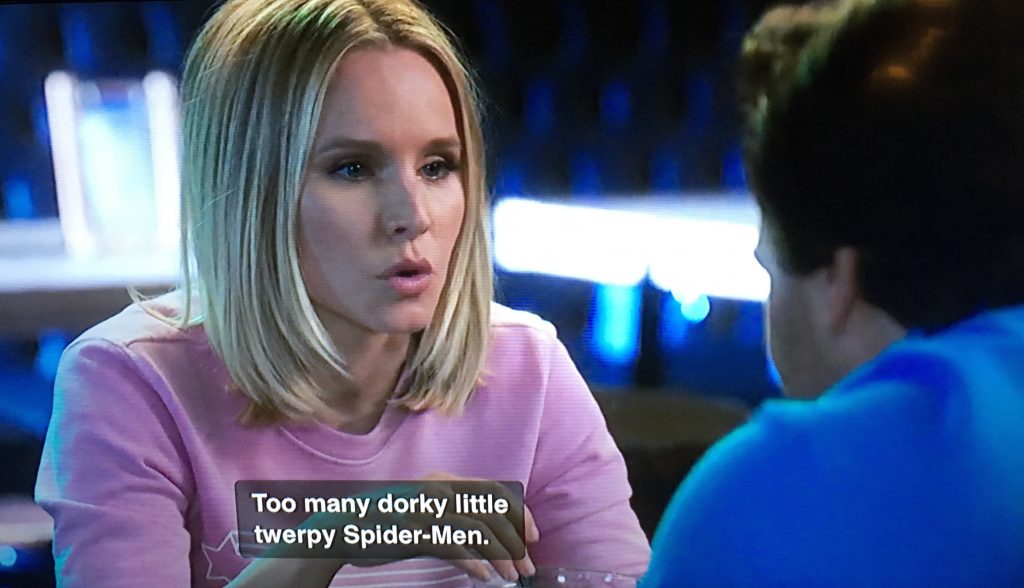Black Widow
In Iron Man 2 (2010), the Marvel Cinematic Universe introduced their first female superhero: Natasha Romanoff, also known as the Black Widow. Since then, she has joined the Avengers as well as played a supporting role with Captain America. However, despite appearing in multiple movies since early in Phase One, she has yet to have her own solo film, though it has long been discussed. As we head into Avengers: Endgame, we know that in addition to surviving ‘the snap’, she will finally be getting her own solo film next year and there is currently talk of an all-female Avengers (A-Force) movie. As a character both within the comics and the MCU, Natasha has evolved since her first appearances at the Russian Femme Fatale to something more complex.
The Black Widow is meant to be one of, if not the best, spies in the business. Overtime, however the MCU’s Black Widow has become softer, which is emphasized by her romance with Bruce Banner/Hulk. In Captain America: The Winter Soldier, Nick Fury comments that Natasha is comfortable with just about anything as long as it gets the job done, but she has since proven that this may no longer be the case.
In Iron Man 2, Natasha is undercover as Natalie Rushman, Pepper Potts’s new assistant. She is later revealed to be an undercover agent for SHIELD, whose mission involves keeping an eye on Tony Stark/Iron Man. She is unapologetic for her actions and ruthless as a fighter; her body is a weapon both for violence and temptation. Beyond her loyalty to Fury, we don’t get much more than that.
Marvel’s The Avengers (2012) serves as her second outing, after which she becomes a feature of the Captain America franchise, although, interestingly, never her love interest, something not hinted in the comics, but in other media. Avengers gives greater emotional depth to her character, establishing a bond between Natasha and Clint Barton/Hawkeye (a romantic partner in the comics). She further demonstrates her effectiveness and capability, able to keep up or even outsmart the men who underestimate her. She demonstrates this particularly in her interrogation techniques, which specifically play on the male assumption that females are overemotional and weak.
Her next appearance is in Captain America: The Winter Soldier (2014), where she becomes Steve Rogers/Captain America’s close ally. In something I believe heavily influenced by the longtime friendship between Chris Evans and Scarlett Johansson, the relationship between Steve and Natasha is close friends, almost like brother and sister. Throughout the film we see her risking herself to help and protect Steve, and even demonstrating her frustration when she lets him down, such as on the Lemurian Star when he learns she was secretly acting under Fury’s orders. The point is, Natasha makes herself vulnerable for the audience and her friendship with Steve.
This vulnerability is further explored in Avengers: Age of Ultron (2015). (Part of me wonders if there would have been a Black Widow/Captain America romance had the pair had more chemistry in Winter Soldier, but instead she pursues a relationship with Bruce Banner/Hulk, whose previous love interest, Betty Ross, has not been referenced since her appearance in The Incredible Hulk (2008).) Ultron also contains one of her most controversial scenes where she tearfully admits she cannot have children. It’s not so much the content of the scene that is controversial as the fact that it exists at all.
Despite the vulnerability she began to show in Avengers, I found this out of character for MCU’s Natasha. I feel that it was included because Joss Whedon felt that this would be the easiest way to demonstrate her vulnerability. This lazy move is one the demonstrates a lack of understanding and implies that all women are defined by the ability to bear children and that all women want children. The result is a beautiful moment of true connection between Natasha and Bruce, but I still find it to be lazy and insulting. Knowing their complex personas, a lot more interesting things could have been done (ie. guilt over killing/hurting/destroying or duality of character). What Whedon does do, is something that is called back to in Thor: Ragnarok. She attempts to coax the Hulk into making the Quinjet detectable so that he can land following the attack on Sokovia.
She has just betrayed Bruce by calling out the Hulk when he tries to get her to run away with him, and this vulnerable moment is used to show how that betrayal affects them both. Later, it is used to remind Hulk/Bruce of the connections he has on Earth. It’s a softness and vulnerability that is very much in line with her characterization in prior films.
Heading into Captain America: Civil War (2016), Natasha is focusing on her job as an Avenger and training their newer members. She is still a powerful, especially as a senior member, and still dangerous, but her humanity is clearer. She shows her vulnerability in how she is torn between Tony and Steve, the Sokovia Accords and the Winter Soldier. Interestingly, after he has been activated by Zemo, she says to the Winter Soldier, “the least you could do is recognize me.” While this could refer to the events of Winter Soldier, the comics depict a romantic relationship between the two (especially with their shared Soviet background), something that may come into play in the Black Widow solo film next year.
Avengers: Infinity War (2018) depicts Natasha Romanoff as Steve Rogers’s second in command. As a fugitive and after years away from Bruce, she has become colder and that vulnerability isn’t really touched upon. From what we’ve seen in Avengers: Endgame trailers, this could continue or we could once again see her stretch her humanity. In the midcredits scene of Captain Marvel (2019), we see her walls down some as she is clearly shaken by the events of Infinity War and the loss of Nick Fury. This could indicated that these aspects of her personality have synthesized into someone who draws on their emotions to add to their strength (a fairly common trope).
Her own solo movie, which is expected to begin filming sometime this year for a 2020 release has its own speculation surrounding it, particularly after Marvel’s first female solo film was released March 8th. I heard a rumor not too long ago that the Black Widow movie may be rated R. Since acquiring Marvel, Disney’s influence has been apparent in the MCU. This is concerning and it’s difficult to imagine Disney allowing an R-rated film, something that has proved effective for Fox’s Deadpool (2016, 2018) and Logan (2017).
On March 20th, Disney officially acquired a number of Fox assets, including 21st Century Fox, which is responsible for the Fantastic Four and X-Men properties. This is huge as it means that Marvel Studios now has access to its full arsenal of characters and storylines (as long as the deal with Sony regarding Spider-Man holds up). The merger has been concerning for fans, who fear how Disney will affect future Fox films, but it has since been suggested that Fox will remain a separate entity, something I have felt to be the best course of action since first hearing of the acquisition.
Disney has limited itself in its branding, but having a separate brand geared towards more mature audiences is a fantastic way to tell a wider range of stories and also snare more moviegoers (profits). I think it is under this banner that the Black Widow movie should be released. The MCU has already established that the Black Widow backstory is a dark one, with Natasha having been raised to be an assassin and sterilized as a young adult to keep her focused, but some of the comics go darker. An R rating is the best way to tell her story.
It’s would also been quite the boon for female heroes. In Captain Marvel (2019), we finally had a female superhero who was powerful all on her own and not outwardly bogged down by romance, as is typical. For female superheroes to be taken more seriously, I believe an R-rated movie is the next step. Making Deadpool R-rated changed how it– and other superhero films– was perceived and I believe the same would be true for Black Widow.
Now, what the movie will contain is a mystery, especially as we await Endgame. I’d personally like to see her past come back to haunt her, intermingling flashbacks with the present day, depicting how her old life effects her new one. Although on principle I’d prefer not to see a romance, I think that Bucky Barnes/Winter Soldier could make a good second in command/sidekick, not unlike the role played by Sam Wilson/Falcon in Winter Soldier.

